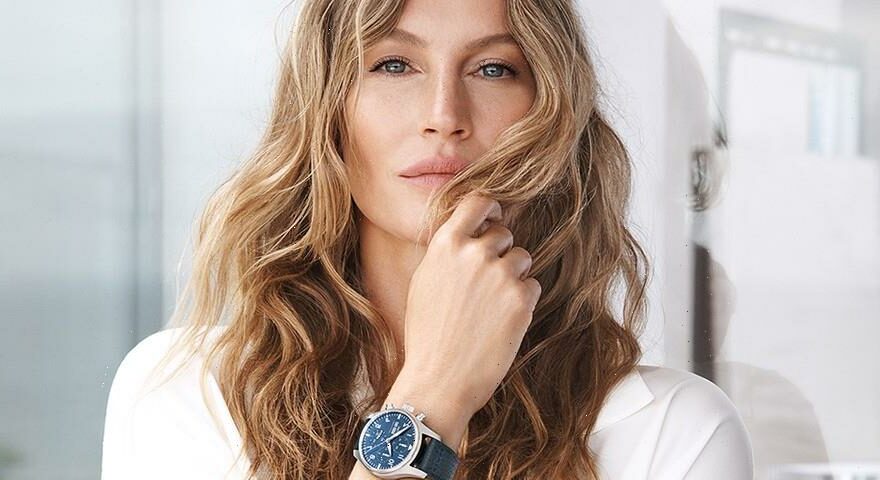Swiss watch brand IWC has appointed supermodel and environmentalist, Gisele Bündchen, as its first Environmental & Community Projects Advisor.
The brand announced Bündchen’s new role to coincide with the publication of its annual Sustainability Report, for which she has written the foreword, which outlines an “ambitious roadmap for the future” called ‘Engineering Beyond Time’.
IWC also announced the introduction of its new Miratex straps, offering a plant and mineral-based leather alternative with no plastic or petrochemicals.

Bündchen has served as a Goodwill Ambassador for the United Nations Environmental Program since 2009, engaging with causes that advocate for biodiversity and wildlife and has been honoured by Havard University and UCLA for her longstanding commitment to environmental issues.
Ahead of the announcement, Hypebeast spoke to the supermodel about her new role.
What does sustainability mean to you?
“I feel like sustainability is to understand the impact you are having, we’re all going to have an impact living on this planet, so it’s understanding and making conscious decisions about how you are choosing things, the impact we have is based on choices we make.”
“That can be as simple as understanding the amount of waste you have, how many times a week you take out the garbage, how am I shopping, what am I choosing, what are the companies I choose to buy from, what are their policies, how are they impacting the world? Because we choose with our purchases.”
“I always tell my kids, ‘things don’t disappear’, when anything is made, an object, whatever it is, it’s in the world, it exists and it’s going to end up somewhere. A lot of things are now recycled, but where do they end up? It’s ‘not out of sight, out of mind,’ I’m constantly stressing this to my kids, I love the whole thing – reduce, reuse, recycle.”
“How much food do we need? How much food gets wasted and thrown away because we’re not planning and organizing ourselves in a better way? It comes from your lifestyle, how are you living, really asking yourself the question, do I need this?”
Have you always been environmentally aware or is this a recent change for you?
“I grew up in the south of Brazil, in a small town. I grew up in a house with two bedrooms and eight people. My clothes came to me from my older sister, I have five sisters, or came from my cousins, we always recycled everything, there was never waste. We’d buy a pot of food and then my grandmother would make jam and use the same pot. So there was nothing that was trash, you always reused everything. I grew up that way, so it comes very naturally for me to think that way.”
“I’ve always been fascinated by indigenous people, because I feel like they have an incredible connection to nature and when I had the opportunity to visit the Amazon in the early 2000s, it was amazing to see how they live, there’s no waste, they’ve been living in communities like this for hundreds and hundreds of years in this way with minimal impact. How can I live more like them? Nature is our home, nature is our temple, we need to take care of our temple and the more we can live in harmony with it, the better it’s going to be for us and for future generations. Becoming a mother, it became even more important, because I began asking myself what kind of world am I leaving for my kids.”
“So I grew up that way, but motherhood really put it front and centre.”
Could you tell us more about the Community Projects element of the role?
“Social and environmental are not separate, I don’t believe they can be, because I think when you have a very sick environment – when the area where you live is sick – that the society is sick. Social and environmental is one because we are nature.”
“IWC understand that as well, this is why the purpose of their overall company is about transparency and responsibility, circularity in their process and really understanding all of that is what I’m very excited to learn from them, because they’re really ahead in the game, they’ve probably been working on this for over ten years, before people were really talking about it, and I’ve been working on it for almost 20 years, so there’s a lot that we can learn and share from each other. The question here is how can we make this bigger, how can we expand this, make it broader and share what we’ve learned with other companies.”
How did you get involved with IWC?
“They called and said they were interested in working with me, and I ask anybody that I work with ‘what is your social and environmental policies?’ because I don’t want to work with anyone that is not really serious about that, and they started showing all the different reports and the different things they were doing and I was impressed. Coming from fashion for almost 27 years now, it’s impressive to see their level of commitment and real engagement in all the different areas of their company and to make commitments to say ‘we’re going to be completely sustainable in using renewable energies by 2022,’ and they did that. Very few companies can say they’ve done that.”
“And I love that they are making a product, where the whole goal for them is to be something that is timeless. That’s beautiful. In fashion, that can happen, I have jackets that I’ve had since I was 19 years old and I’m 42, and I love it, these are my favorite pieces. When you make things with quality then it has history, it has energy. Something that is recyclable doesn’t become less, I think it becomes more valuable because it has a different energy to it. They recycle all the different materials that they use.”
“First of all they try to fix the thing you have, if you have a watch face that’s 100 years old and you still want to fix it, say it was your grandfather’s watch, that’s amazing, tell me how many companies do that. You buy a TV and two years later its broke, my grandparents had a TV and it would last 20 or 30 years. So I think it’s admirable to have a company that makes that a priority. The whole world needs to catch onto this wagon, my intention working with them is how can we help other companies be inspired and almost have an open source policy of how we were able to do all those things and inspire other companies to figure out how to do it themselves.”
Source: Read Full Article
